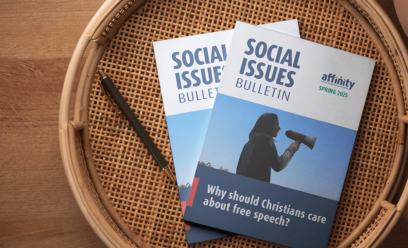Unity Without Compromise: How should evangelicals relate?

The challenge of gospel unity
It is essential that we express and foster unity between believers. Promoting unity fulfils Jesus’ prayer for the church in John 17: ‘that they may be one’, with the outcome that ‘the world will know that you sent me’. Our unity is not optional; it is a divine command and a vital part of our witness. It is also the essence of who we are as God’s chosen people, united under one head, the Lord Jesus Christ (Eph 1:8-10; 4:15). We do not create or choose unity – we express what is already, essentially, true in Christ.
Ephesians 4 brings these two ideas together brilliantly. Verse 3 calls us to ‘make every effort to keep the unity of the Spirit’, while verse 4 reminds us that our unity is an outworking of the oneness that already exists: ‘one hope… one Lord…’.
The primary place where our oneness is experienced – and most tested – is the local church. It is the only essential Christian organisation in the New Testament and the primary agent for evangelism and discipleship. All other bodies – whether denominations, networks, or agencies – are optional and should exist only to serve the local church in its mission. Yet they can be useful in allowing us to do things together. As we see throughout Acts, unity between churches and Christians in different places was expected and expressed through the regular sharing of resources, prayer, and practical care. Early Christians took an interest in what was happening in other churches and maintained regular contact.
Led by the apostles, the early churches were united in their gospel theology. There were sometimes differences in practice and personal disagreements (as seen in the example of Paul and Barnabas), but they all held to one essential body of truth. The apostles taught about cultural and practical differences through the concepts of the ‘weak’ and the ‘strong’. Yet false teaching was never to be embraced as part of ‘diversity’ within the church.
How do we unite?
Today, Christian organisations formalise the connections that existed in the early church. We do not have apostles, but we do have the Scriptures, which are sufficient to teach us the true gospel that unites us, to identify false teaching, and to navigate differences. This is not always easy. We need to be diligent in study, but we also need the Spirit’s help in discerning how to live together.
Some argue that we should unite around primary issues and accept one another on secondary issues. I have some sympathy with this idea, but who gets to decide what is primary? I do not want to relegate things that God has revealed as unimportant.
Another approach is to unite as evangelicals – but this is not as simple as it sounds. Much effort has gone into defining the essentials of evangelicalism. We try to capture these fundamentals in statements of faith, but the term ‘evangelical’ can still mean different things to different people.
There are separatist groups that believe the rest of UK evangelicalism has compromised the gospel to such an extent that they consider them false teachers. For them, there are no secondary issues – or at least very few.
Then there are conservative evangelicals, who hold a high view of the authority of Scripture, the doctrine of atonement, and are complementarian, mostly functionally cessationist, and committed to expository preaching. Organisations such as the Evangelical Movement of Wales (EMW) and Affinity sit within this group. Because of historical and cultural factors, conservative Anglicans and free churches have had limited connections, even though they often share very similar convictions. This group can be the most difficult to unite because of its emphasis on rigorous theology and ministry practices.
The largest group identifying as evangelicals is broader in theology and practice, including many of the newer church movements. This group prioritises relationships over formal theological statements and, institutionally, probably represents the majority within the Evangelical Alliance.
Finally, there are those who call themselves evangelicals but deny fundamental biblical truths about God, sin, salvation, and morality.
Although broader evangelicals and conservative evangelicals often have similar statements of faith, unity is challenging due to deeply held differences on other issues, such as women’s ministry.
Intention and realism
How do we best navigate this complex church landscape? Since visible unity is essential, we must make every effort to work at it – not just within churches, but also between them. We need to step outside our comfort zones. This can start at a personal level with Christians we know in our locality or social circles. We must be careful not to write people off but to listen to their stories and their understanding of the gospel.
Between churches, this unity can be expressed through local partnerships based on gospel agreement. Regional gospel partnerships can also provide useful ways to share resources and training. National organisations like EMW and Affinity forge relational unity based on shared doctrinal commitments and ministry practices.
In an ideal world, we would be united in every sense with all true believers. However, in reality, differences in practice, culture, theological emphasis, and ministry approach mean this is not always possible. We may recognise individuals as fellow Christians but, in good conscience, decide not to join their churches or organisations.
We must also be discerning about Christian denominations and organisations. Some large, unaccountable structures risk becoming more powerful than the local church, serving as ends in themselves rather than as support for gospel ministry.
Generous without compromise
We want to be generous and open in sharing fellowship with other believers beyond our own blind spots. At the same time, we must humbly discern what is primary – what constitutes true evangelical faith. Theology matters to us because it matters to God. We must think carefully about how to express unity without compromising the gospel.
My constituency probably unites around a smaller set of distinctives that we like to think are purely theological but may also be cultural, even tribal. We need to reflect carefully on what truly unites or divides us. Is it central gospel issues, or cultural traditions?
Gospel unity vs. tribal unity
| Gospel unity is based on the gospel. | Tribal unity is based on the gospel plus tribal traditions. |
| Gospel unity works for the honour of Christ. | Tribal unity works for the honour of the tribe. |
| Gospel unity fights for truth. | Tribal unity fights for territory. |
| Gospel unity gives the benefit of the doubt. | Tribal unity is suspicious. |
| Gospel unity cares about God’s revelation. | Tribal unity cares about being right. |
| Gospel unity promotes Christ. | Tribal unity promotes tribal leaders. |
| Gospel unity tries to bring people in. | Tribal unity tries to keep people out. |
The great challenge is how we express and promote gospel unity. How do we stop being a constituency and start being the body of Jesus Christ – united but diverse? Not compromised, but not compartmentalised either. My assumption is that this is something we all desire. My fear is that we are more prone to tribal unity.




